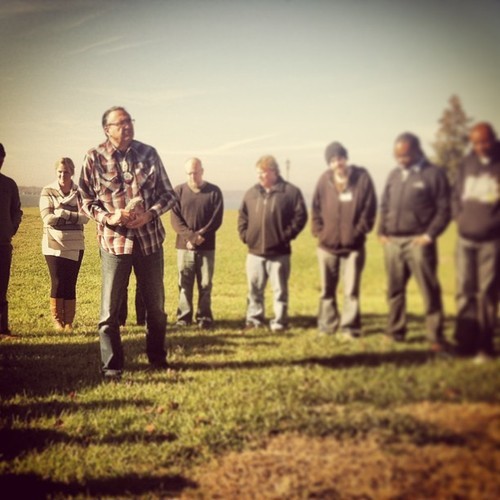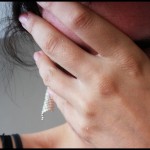Breaking Open the Heart

Today my heart broke open with sorrow for the ways my people stripped the Native American nation of their spiritual traditions and practices. My friend Richard Twiss conveyed how his people were told by white people that their practices were “demonic,” “evil,” “bad.” And how they were forced in every way possible to adopt the white man’s white god—systematic cultural cleansing.
White America’s broken relationship with Native America is not news to me, but encountering our history in the flesh and blood body of a Native elder’s testimony reveals history in a way that books cannot. Certainly there have been some strides in American culture to retroactively honor the Native nation, but the wound has been inflicted and it will take generations before it heals.
On this particular morning, the reality of such horrific victimization grabbed hold of me and I couldn’t hold back the tears. My mind, body and soul craved to repent on behalf of my race and my religion. Christian teaching encourages this idea of repentance with many references in the Hebrew and Christian sacred texts:
Isaiah 30:15 (NIV) This is what the Sovereign LORD, the Holy One of Israel, says: “In repentance and rest is your salvation…
Luke 13:3b (NIV) “But unless you repent, you too will all perish.”
Matthew 4:17 (NIV) From that time on Jesus began to preach, “Repent, for the kingdom of heaven is near.”
Matthew 3:2 (Phi) “You must change your hearts and minds, for the Kingdom of Heaven has arrived!”
Unfortunately, we’ve missed the scope of Jesus’ teaching by limiting repentance to a confession or obligation to admit wrongdoing in order to be accepted by God and ultimately admitted into heaven. Jesus’ teaching is much more transformational than that. What Jesus invited us into was a complete reform of thinking, intention and behavior so that we could experience heaven now—liberation, unity, peace, love. If we can get this on a personal, relational level, we have the chance of getting it on a communal, national, global level. As Gandhi so wisely admonished us to be the change we want to see in the world.
As Richard prayed, the sage he burned worked to purge the infection from the wound I confronted, good medicine indeed. I wept and the tears attempted to cleanse. Certainly I was grieving for my Native brothers and sisters but I wept also for my people and me. It had to be this way; for repentance acknowledges that when we wrong someone else, we’re simultaneously wronging ourselves. In the realm of repentance we grasp that we are one.
Contrary to historical white dominant consciousness, stripping our Native brothers and sisters of their holy practice is the actual evil, leaving them naked and vulnerable. As they are disgraced, bare and wounded, we are left wanting what they now struggle to give. In their torturous stripping we are all robbed of sacred ritual and practice that can heal our world. But naming their holy ways as “evil” disrobes our Native family of more than their holy ritual and practice; it tears beneath their skin into their very identity and dignity—a wound that does not quickly heal. This kind of government and religious exploitation is nothing short of wicked, for it steals from all of us the presence of God that unifies, heals and transforms our world.
“Humankind has not woven the web of life.
We are but one thread in it.
Whatever we do to the web,
We do to ourselves.
All things are bound together.
All things connect.”
-Chief Seattle
photo credit: Chris Heuertz



